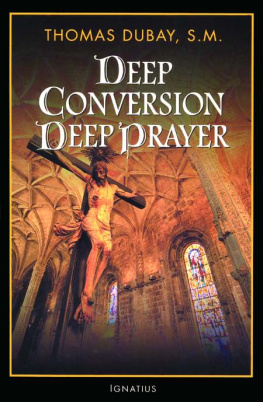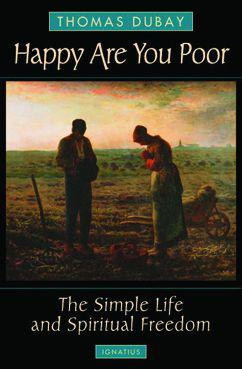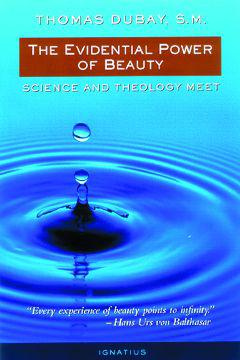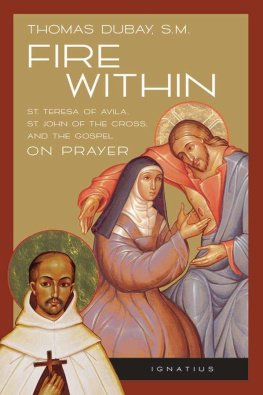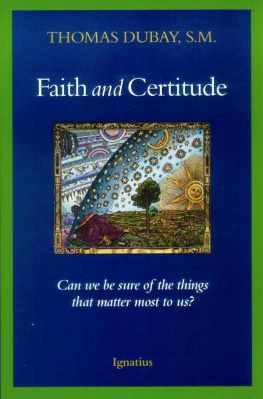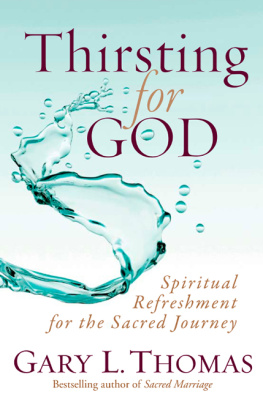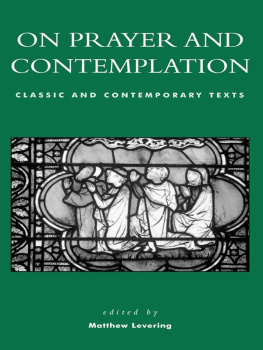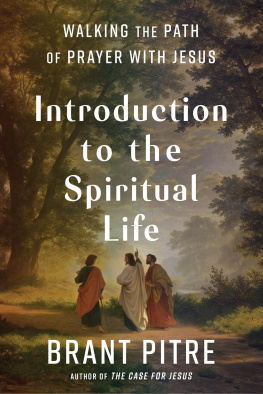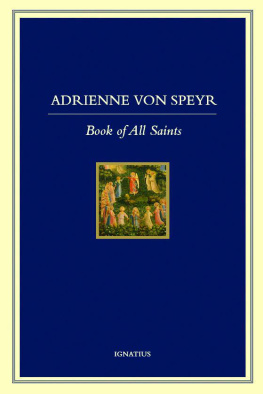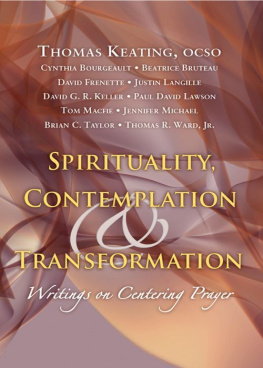DEEP CONVERSION / DEEP PRAYER
THOMAS DUBAY, S.M.
Deep Conversion/
Deep Prayer
IGNATIUS PRESS SAN FRANCISCO
Unless otherwise noted, all Scripture quotations (except those within citations) have been taken from the Revised Standard Version of the Holy Bible, Catholic Edition. The Revised Standard Version of the Holy Bible: the Old Testament, 1952; the Apocrypha, 1957; the New Testament, 1946; Catholic Edition of the Old Testament, incorporating the Apocrypha, 1966; the Catholic Edition of the New Testament, 1965, by the Division of Christian Education of the National Council of the Churches of Christ in the United States of America. Used by permission. All rights reserved. A few verses are taken from The Jerusalem Bible, 1966 by Darton, Longman and Todd, Ltd. , and Doubleday, a division of Bantam, Doubleday, Dell Publishing Group.
Cover art: John and Lisa Merrill / Corbis
Cover design by Riz Boncan Marsella
2006 Ignatius Press, San Francisco
All rights reserved
ISBN 978-1-58617-117-9
ISBN 1-58617-117-8
Library of Congress Control Number 2005933370
Printed in the United States of America
Your first duty as pastors
is not projects and organizations,
but to lead your people to a deep intimacy
with the Trinity.
John Paul II
to the Austrian bishops
CONTENTS
ABBREVIATIONS
AMC Ascent of Mt. Carmel
EPB Evidential Power of Beauty
FW Fire Within
JB The Jerusalem Bible
LG Lumen gentium, Constitution on the Church (Vatican Council II)
NCE The New Catholic Encyclopedia
SC Sacrosanctum concilium, Constitution on the Liturgy (Vatican Council II)
TLG Treatise on the Love of God
GETTING A FEEL
If someone interested in trivia was to ask me to name the ten historical persons who have had the greatest impact on my life (aside, of course, from the Lord and his Mother), my list would include Saints Augustine, Thomas Aquinas, Teresa of Avila, John of the Cross, together with John Henry Newman and Hans Urs von Balthasar. To determine the other four might take a bit more pondering, but among them would surely be the man with whom we shall begin our reflections: Saint Bernard of Clairvaux.
This doctor of the Church, a man of towering talent, brilliant mind and golden eloquence, traveled about Europe at the behest of the pope as a highly gifted troubleshooter. But more important than his natural gifts was his sanctity. At about the age of twenty he entered the Cistercian order, bringing thirty other men along with him. Most of us entering a religious community bring no one but ourselves. The monks recognized the youngster early on as a highly unusual newcomer and before long elected him as abbot. Bernard united among his many talents fearlessness and tenderness, a rare combination. The most touching funeral homily I have ever read or heard was the one he delivered at the death of his blood brother. The saint was a man of profoundly deep prayer and love for Godwhich, of course, translated, as it always does, into a genuine love for the people in his life.
A fine biographer of Bernard details for about six hundred pages the drift of this paragraph, but we will get to our immediate point without further ado.
The young abbot was speaking to his community one day, and he made a remark that shocked me on my first reading of it. There are more people converted from mortal sin to grace, than there are religious converted from good to better. Over the years the more I have experienced of life and thought about this statement the more I have been convinced of its truth. Yet one may ask, what is so shocking about it?
Before responding to this question, it may be helpful to unpack the implications of this plain fact. What Bernard said of religious unfortunately is true in all states of life: bishops, priests, married men and women. Routine daily experience bears it out. Like any competent speaker, the saint wanted to be clear and direct, and so he spoke of the men in front of him. Yet we may wonder: what is shocking about this prosaic but seldom discussed truth?
Putting the saints observation in simple contemporary terms may help. Bernard was saying that there are more men who give up serious alienation from God, mortal sin, than there are people who give up small wrongs, willed venial sins. And there are even fewer who grow into heroic virtue and live as saints live. If we are not saddened by this realization, we ought to be. We need to notice the title of this book: Deep Conversion/Deep Prayer. The twice repeated adjective is important. Seldom explained, it is what we are about here.
Yet a bit more unpacking is needed. A large part of the sadness is the expectation that anyone who basically loves another (real sacrificing love, not mere attraction) in important matters (for example, a husband loving his wife), would naturally go on to love her in smaller ones. I would assume that he would stop being grouchy and abrupt and harsh, that he would be at pains to be kind and gentle, patient and forgiving. I would assume the same in her behavior toward him.
A step further: We would suppose that a person who realistically and fundamentally loves God would be at pains to avoid all smaller offenses against him: gossiping, laziness, overeating, as well as the venial sins mentioned in our previous paragraphand myriads of other minor wrongs. A third step of unpacking: Most of us would like to think that this person would go on to prove his love further even to the point of total self-giving, even under the duress, hardships and sacrifices entailed in persevering in heroic holiness. But everyone knows that such is unhappily a rare occurrence in the human family. Something is amissand on a large scale. Yes, if everything were normal in society, deep conversion would be common, and life would be incomparably happier for everyone. Much more about that as we proceed in our task.
What Is Moral Conversion?
To a goodly number of people the idea of moral conversion is heavily negative, even threatening. It suggests giving up fun things, making sacrifices, cutting down and cutting out, getting rid of numerous selfishnesses. This reaction is understandable, but it is only the smaller aspect of a larger and liberating truth.
An accurate synonym for conversion, as we are using the word here, would be transformation. Put simply, conversion is a basic and marked improvement on the willing level of the human person. Even more pointedly, it is a fundamental change in our willed activities from bad to good, from good to better, and from better to best. Anyone who is fully alive will find this a stimulating set of ideas. We can put the matter in still another way. Conversion is a change from vice to virtue: from deceit and lying to honesty and truth... gluttony to temperance... vanity to humility... lust to love... avarice to generosity... rage to patience... laziness to zeal... ugliness to beauty.
From the point of view of attention to and intimacy with God, supreme Beauty, supreme Delight, conversion includes a change from little or no prayer to a determined practice of christic meditation leading eventually to contemplative intimacy, pondering the word day and night, leading to a sublime gazing on the beauty of the Lord with all its varying depths and intensities (Ps 1:1-2; 27:4).
In all of secular literature there is nothing that approaches the literary excellence and the touching tenderness of the parable of the prodigal son, a matchless portrayal of conversion and forgiveness. If the reader notices and ponders the small details of this masterpiece, he finds the divine handwriting throughout the narrative. One verse may exemplify what we mean by this high praise. The egocentric son, having wasted half of his fathers fortune with prostitutes, finally comes to his senses, renounces his sins and decides to return to his father. We are then struck with the extraordinary welcome he receives: While he was still a long way off, his father saw him and was moved with pity. He ran to the boy, clasped him in his arms and kissed him tenderly (Lk 15:20 JB). Not a single word of reproachthe sinner had already repented. Music, dancing and feasting follow. This scene with its touching tenderness and complete forgiveness is nothing short of divine. The son has been restored to life. He has been transformed, converted and healed. This passage from ugly egocentrism to divinized altruism is a literary and theological gem profoundly instructive for each of us.

